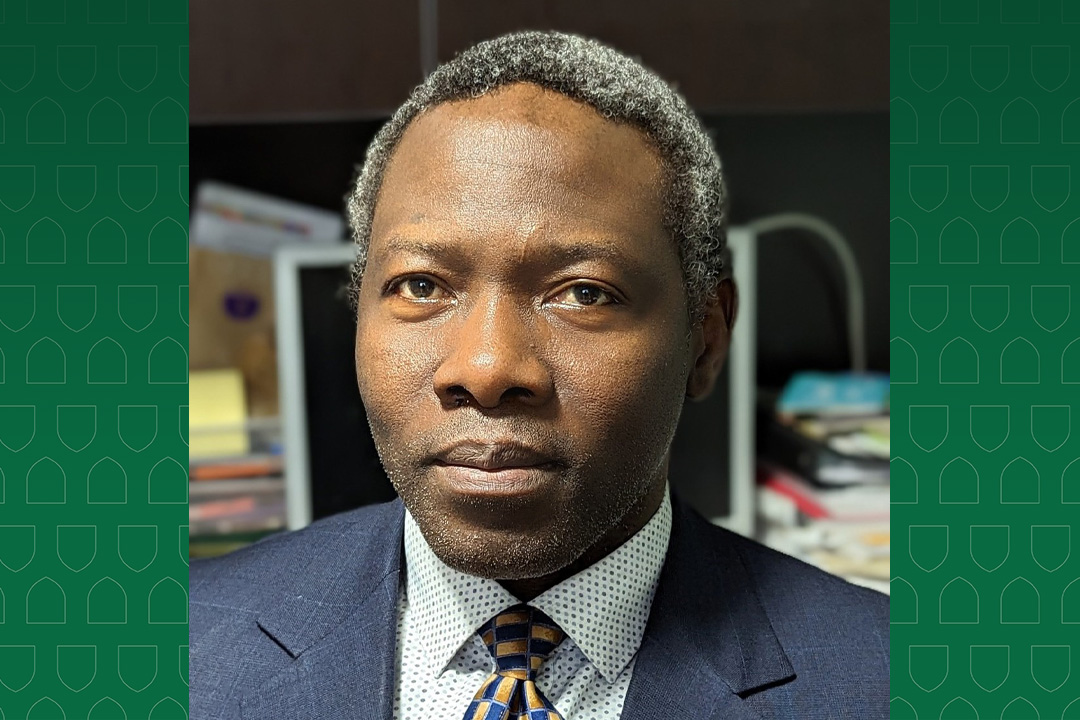
Mela proud of forensics centre, own contribution to USask
You could say that the University of Saskatchewan (USask) was the answer to a prayer for Dr. Mansfield Mela (MBBS) back in 1999, when he was pondering his future.
By Sarath PeirisMela was in the United Kingdom, having just completed his psychiatric residency training at Cardiff University in Wales and a Master of Science degree in psychiatry he had embarked upon at home in Nigeria.
“I was praying for direction when a colleague contacted me from Saskatoon, saying, ‘Do you want to come and have a look at what we have here?’” said Mela.
Mela took up the invitation, travelled west for a look-see, and joined USask as a clinical tutor in 2000. Today, he is a professor of psychiatry in USask’s College of Medicine, associate faculty member in the College of Law, and director of USask’s Centre for Forensic Behavioural Science and Justice Studies, which he and colleagues helped found in 2009 under the leadership of Dr. Stephen Wormith (PhD).
Recognized as a Founder of the forensic psychiatry subspeciality in Canada, Mela’s research deals with understanding how people with mental health disorders intersect with the legal system, with a special focus on fetal alcohol spectrum disorder (FASD) and criminal consequences that arise from FASD.
He also researches how medication can help to reduce criminality, as well as the role of forgiveness in reducing criminality.
“What that means is helping individuals who have hurt others, to recognize their own victimization,” he said. “It’s about guiding and supporting them through the process of reducing their bitterness and resentment that have led them to victimize others.”
In addition to his forensics research, Mela educates lawyers and psychiatrists on becoming medical/legal experts to deal with the courts, and also engages in patient-oriented research to include the voices of clients in developing solutions and strategies in forensic mental health.
He highlights the substantial contribution the forensics centre makes to ensuring that communities in Saskatchewan and across Canada are safe.
The forensics centre was involved in establishing and evaluating Saskatchewan’s first mental health court in Saskatoon, he said, with the province since expanding these courts to other communities. As well, an evaluation by the centre of an FASD pilot project at the Regional Psychiatric Centre has the federal government looking at establishing more FASD clinics across Canada.
“I’m really proud of our small forensic centre that does a lot of work with the Ministry of Corrections, Ministry of Justice, policing services, as well as the federal government and public safety departments,” Mela said. “The research we do really contributes to that safety, allowing people to make this home.”
Twenty-three years after his arrival, Mela is ensconced in Saskatoon with his spouse and three boys, has learned to tolerate—if not accept—the weather, plays badminton instead of his beloved cricket, and watches basketball and hockey although he plays neither.
As for his experience over that time as a Black academic at USask, Mela identifies many positive as well as negatives.
“I have been blessed and fortunate to have been recruited by someone whom I thought was exceptionally blind to colour,” said Mela. “Dr. David Keegan (MD) was more interested in, ‘can you deliver the goods?’ And that’s how I got into the medical faculty.”
And he feels fortunate to have worked with colleagues to whom his colour mattered little.
“I’ve never felt that my promotion was interfered with in any way. My work and the things that I’ve done have been devoid of those discriminatory practices,” he said.
“I also have a very strong community and church group that have been very helpful in reducing the unavoidable stresses you get from day-to-day.”
However, as a prominent Black USask faculty member, Mela has been a mentor to others whose experience was much different.
“I hope that in due course people will be taken for who they are and what they bring to the table, not what their colour is.”
Mela wants Black History Month to be a celebration of the many Black people at USask and in Saskatoon who are doing extremely well and has some thoughts for those who struggle to accept or appreciate the work done by anybody in the Black community.
“They can rest assured that the examples of some of us is evidence enough that there are people from the community who do not depend on handouts but do the work that every other person does,” he said.
“For those who do not have those tendencies of discrimination but contribute to it by their silence, my encouragement is to step up. Celebrate and accept as well as speak up if you are seeing racism happening.”
Article re-posted on .
View original article.

